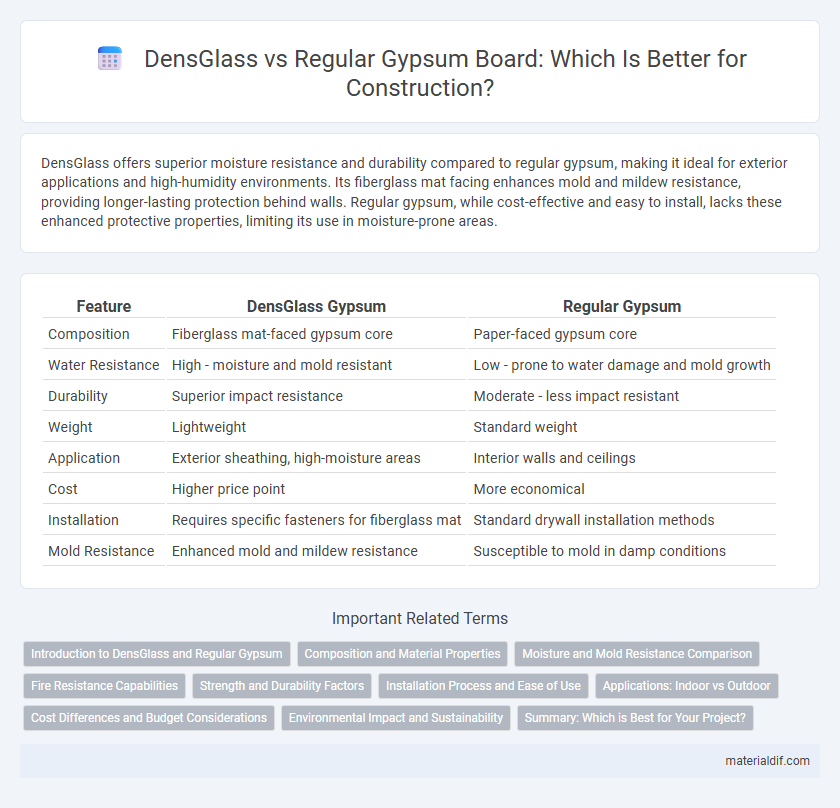DensGlass offers superior moisture resistance and durability compared to regular gypsum, making it ideal for exterior applications and high-humidity environments. Its fiberglass mat facing enhances mold and mildew resistance, providing longer-lasting protection behind walls. Regular gypsum, while cost-effective and easy to install, lacks these enhanced protective properties, limiting its use in moisture-prone areas.
Table of Comparison
| Feature | DensGlass Gypsum | Regular Gypsum |
|---|---|---|
| Composition | Fiberglass mat-faced gypsum core | Paper-faced gypsum core |
| Water Resistance | High - moisture and mold resistant | Low - prone to water damage and mold growth |
| Durability | Superior impact resistance | Moderate - less impact resistant |
| Weight | Lightweight | Standard weight |
| Application | Exterior sheathing, high-moisture areas | Interior walls and ceilings |
| Cost | Higher price point | More economical |
| Installation | Requires specific fasteners for fiberglass mat | Standard drywall installation methods |
| Mold Resistance | Enhanced mold and mildew resistance | Susceptible to mold in damp conditions |
Introduction to DensGlass and Regular Gypsum
DensGlass is a fiberglass mat gypsum sheathing known for its moisture resistance and durability, making it a preferred choice in exterior wall assembly and areas prone to humidity. Regular gypsum board, commonly used for interior walls and ceilings, consists of a gypsum core sandwiched between paper facings, offering fire resistance but limited moisture protection. The key distinction lies in DensGlass's enhanced mold resistance and structural integrity, providing superior performance in challenging environments compared to traditional gypsum.
Composition and Material Properties
DensGlass is composed of a fiberglass-mat faced gypsum core that enhances moisture resistance and durability compared to regular gypsum board, which consists of a paper-faced gypsum core prone to moisture damage. The fiberglass mat in DensGlass provides superior mold and mildew resistance, making it suitable for high-humidity environments, unlike traditional gypsum that lacks this protective layer. DensGlass also offers better dimensional stability and impact resistance, contributing to increased longevity and performance in exterior and interior applications.
Moisture and Mold Resistance Comparison
DensGlass gypsum board features a fiberglass mat facing that provides superior moisture resistance compared to regular gypsum, which typically uses paper facings prone to mold growth. Unlike standard gypsum drywall, DensGlass resists water absorption, reducing the likelihood of swelling, deterioration, and mold infestation in high-humidity environments. This enhanced durability makes DensGlass an ideal choice for applications in bathrooms, kitchens, and exterior sheathing where moisture exposure is a significant concern.
Fire Resistance Capabilities
DensGlass sheathing offers superior fire resistance compared to regular gypsum due to its fiberglass mat facing, which enhances its ability to withstand high temperatures and slow down flame spread. Regular gypsum, while inherently fire-resistant because of its chemically bound water, lacks the added durability and moisture resistance that DensGlass provides, making it less effective in prolonged fire exposure scenarios. Building codes often favor DensGlass in applications requiring enhanced fire-rated assemblies due to its combination of fire resistance and structural performance.
Strength and Durability Factors
DensGlass offers superior strength and durability compared to regular gypsum due to its fiberglass mat facing and moisture-resistant core, making it ideal for high-humidity environments and exterior applications. Its enhanced impact resistance and mold prevention extend the lifespan of structures, outperforming traditional gypsum board, which is prone to sagging and deterioration when exposed to moisture. These strength and durability factors make DensGlass a preferred choice in commercial construction and areas requiring robust performance.
Installation Process and Ease of Use
DensGlass panels feature a fiberglass mat facing that resists moisture and mold, making installation faster and reducing the need for additional waterproofing compared to regular gypsum boards. The lightweight and durable design of DensGlass improves handling and minimizes damage on-site, enhancing overall ease of use. Regular gypsum requires careful moisture protection measures and is more prone to crumbling during installation, which can extend labor time and complexity.
Applications: Indoor vs Outdoor
DensGlass panels feature a fiberglass mat facing that provides superior moisture resistance, making them ideal for exterior applications such as sheathing, soffits, and eaves. Regular gypsum board, lacking this moisture barrier, is best suited for indoor environments like walls and ceilings where humidity is controlled. The enhanced durability and weather resistance of DensGlass enable it to withstand outdoor conditions without compromising structural integrity or finishing quality.
Cost Differences and Budget Considerations
DensGlass sheathing typically costs more per sheet than regular gypsum due to its fiberglass mat facing and moisture-resistant properties, making it a preferred choice for exterior applications or areas exposed to moisture. Regular gypsum board is more budget-friendly and widely used for interior walls and ceilings where moisture exposure is minimal. When planning budgets, factoring in the higher initial cost of DensGlass can lead to long-term savings by reducing potential moisture damage and maintenance expenses.
Environmental Impact and Sustainability
DensGlass sheathing offers superior environmental benefits compared to regular gypsum by utilizing fiberglass mat facers that resist mold and moisture, reducing waste and the need for replacements. Its enhanced durability increases building lifespan, lowering resource consumption and carbon footprint over time. Regular gypsum boards, prone to water damage and mold growth, often require more frequent replacement, contributing to higher landfill waste and environmental strain.
Summary: Which is Best for Your Project?
DensGlass outperforms regular gypsum with superior moisture resistance, mold prevention, and enhanced durability, making it ideal for exterior and high-humidity applications. Regular gypsum offers cost-effective, standard fire resistance suitable for interior, dry environments where budget constraints are a priority. Selecting between DensGlass and regular gypsum depends on project-specific factors such as exposure to moisture, longevity requirements, and overall budget.
DensGlass vs Regular gypsum Infographic

 materialdif.com
materialdif.com